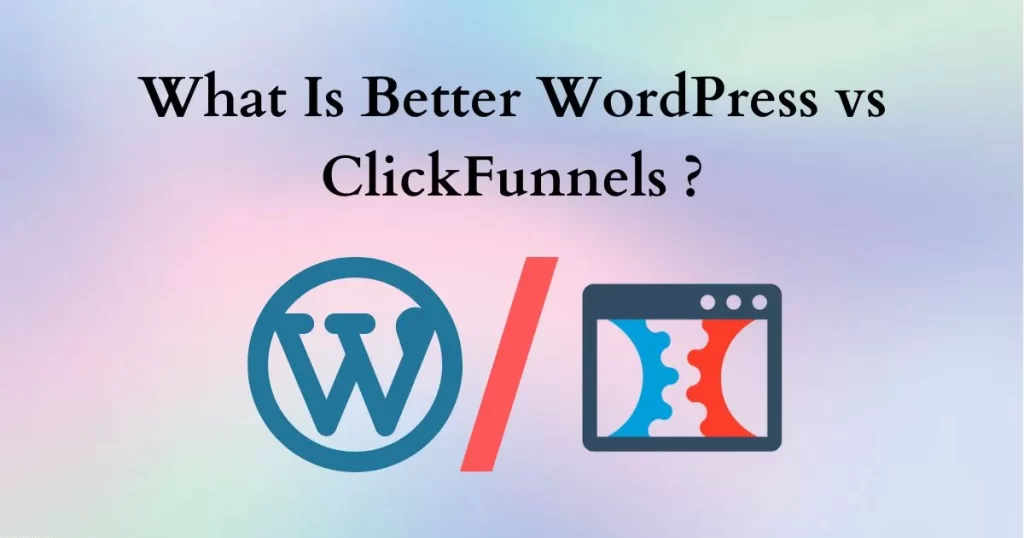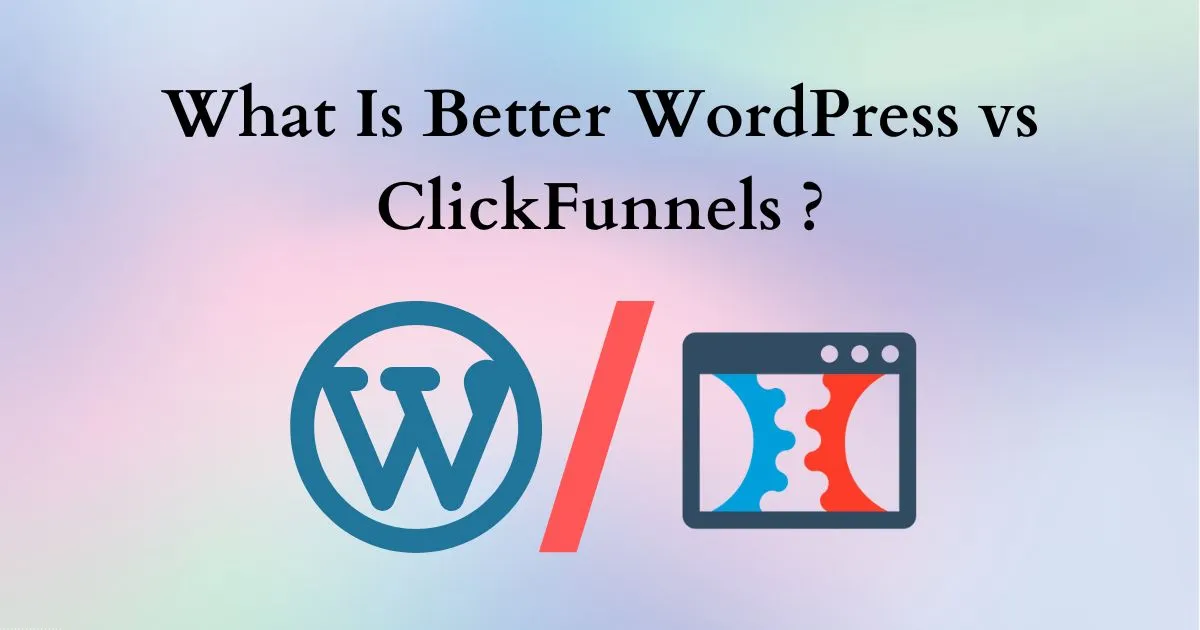Choosing between WordPress vs ClickFunnels is like deciding between a versatile toolbox (WordPress) and a specialized tool (ClickFunnels). WordPress lets you build various types of websites, while ClickFunnels is designed for creating sales funnels.
If you want flexibility and options, go for WordPress. If you’re focused on making effective sales funnels without tech complexities, ClickFunnels might be your choice. This article compares them on cost, ease of use, customization, tools, security, and online selling features to help you decide.

1) WordPress vs ClickFunnels: Pricing
How Much Does WordPress Cost?
When it comes to pricing, WordPress has quite the advantage. The open-source nature of the platform allows users to download and install it for free. You’ll need a domain name (like your website’s address) and a place to store your website, called web hosting. This could cost you around $3 to $25 per month, depending on what you need for your website.
How Much Does ClickFunnels Cost?
Omit, ClickFunnels offers a subscription-based model with various pricing plans. The basic plan starts at $97 per month while the Etison Suite plan is priced at $297 per month. While the cost might seem higher compared to the budget-friendly setup of WordPress, ClickFunnels offers more features designed especially for sales funnels.
If You are Looking For WordPress Website Developer You Can Contact Me
2) WordPress vs ClickFunnels: Ease of Use
WordPress Ease of Use
WordPress is renowned for its user-friendly interface and intuitive design. WordPress offers a dashboard that lets you easily control your website content and make updates without needing to know how to code. What’s more, there are plenty of online resources that can help you understand and use WordPress effectively.
ClickFunnels Ease of Use
ClickFunnels was made mainly to do one thing: make it super easy for anyone to create sales funnels that turn visitors into customers. It comes with a drag-and-drop editor and ready-made templates designed for various kinds of businesses. This means even if you don’t have much tech know-how or experience, you can build landing pages without any trouble.
3) WordPress vs ClickFunnels: Customisation
Customization in WordPress
If customization is important to you, then WordPress takes the crown here too. Because it’s an open-source platform with help from a big group of developers all around the world, there are tons of themes and plugins you can use. These let you have total control over how your website appears and works.
Customization in ClickFunnels
On the other hand, ClickFunnels is mainly made for creating sales funnels, so it doesn’t offer as many choices for customizing. Even though you can change how your landing pages and funnels look a bit, it’s not as flexible as what WordPress gives you.
4) WordPress vs ClickFunnels: Publishing Tools
WordPress CMS
WordPress is widely known for its Content Management System (CMS) capabilities. It allows you to publish blog posts, create complex website structures, manage user roles and permissions, and much more. The versatility of WordPress makes it suitable not only for small blogs but also for large business websites.
ClickFunnels Publishing
ClickFunnels focuses on one thing – creating sales funnels that convert visitors into customers. While ClickFunnels provides tools made just for publishing with that goal in mind, it doesn’t have all the features that make it simpler to handle websites with lots of content. If blogging and making detailed content are really important for your marketing plan, then WordPress would be a smarter pick.
5) WordPress vs ClickFunnels: Security
Security is crucial when choosing any online platform for your business needs.
WordPress Security
Due to its popularity*, WordPress’s security vulnerabilities have been targeted by hackers more frequently than other platforms. But,out-of-the-box measures have been improved over time,and there is many plugins available dedicated solely to boost wordpress site security preventing possible threats
ClickFunnel’s Security
With Clickfunnlels being an all-in-one solution,having someone else take care of security* This ensures that their users’ data remain safe from breaches or attacks.A managed service means regular updates as well as robust protection against malware detection.
WordPress
Pros:
- Free with affordable hosting
- Vast customization options Cons:
Ease-of-use requires learning curve
Ethical hacking & penetration testing
Cost-effective E-commerce functionality.
ClickFunnels
Pros:
Easy-to-use drag-and-drop interface Pre-built funnels tailored for specific industries
Cons:
Less flexible customization options Higher pricing plans
No built-in blogging functionality
6) WordPress vs ClickFunnels: eCommerce
WordPress eCommerce
One of the advantages of using WordPress is its flexibility in creating and managing an online store. With plugins like WooCommerce, you can easily transform your website into a fully functional eCommerce platform. This allows you to sell products, manage inventory, and process payments with ease.
ClickFunnels eCommerce
On the other hand,ClickFunnels offers a more streamlined approach to selling products online through sales funnels. While it may not have all the features that come with a full-fledged eCommerce platform like WooCommerce, it provides simplified tools for creating effective checkout processes and upselling opportunities within your funnels.
Conclusion: Is ClickFunnels Better than WordPress?
To wrap up, deciding between ClickFunnels and WordPress really depends on what you need and want to achieve. If you want lots of choices, the ability to make things your way, and the potential to grow big, then WordPress is the way to go. But if you mainly care about making effective sales funnels without getting caught up in tech stuff, then ClickFunnels might be just what you’re looking for.
